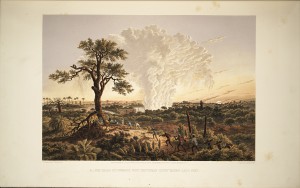
Thomas Baines 1820-1875
For a British Empire that stretched across much of the globe at the beginning of the 19th century, the interiors of Africa and Australia remained intriguing mysteries. The challenge of opening these continents to imperial influence fell to a proto-professional coterie of determined explorers. They sought knowledge, adventure and fame, but often experienced confusion, fear and failure. “The Last Blank Spaces: Exploring Africa and Australia” (Harvard University Press, 2013) follows the arc of these explorations, from idea to practice, from intention to outcome, from myth to reality.
Dane Kennedy, author of “The Last Blank Spaces,” will discuss and sign his book on Monday, Sept. 9, at noon in the Mumford Room, sixth floor, Madison Building, 101 Independence Ave. S.E. This Books & Beyond event, sponsored by the Center for the Book in the Library of Congress, is co-sponsored with the Smithsonian Libraries. It is free and open to the public; no tickets are required.
Those who conducted the hundreds of expeditions that probed Africa and Australia in the 19th century adopted a mode of scientific investigation that had been developed by previous generations of seaborne explorers. They likened the two continents to oceans, empty spaces that could be made truly knowable only by mapping, measuring, observing and preserving. They found, however, that their survival and success depended less on this system of universal knowledge than it did on the local knowledge possessed by native peoples.
Dane Kennedy is the Elmer Louis Kayser professor of history and international affairs at George Washington University. He is also the author of “The Highly Civilized Man: Richard Burton and the Victorian World.”
Since its creation by Congress in 1977 to “stimulate public interest in books and reading,” the Center for the Book in the Library of Congress (www.Read.gov/cfb/) has become a major national force for reading and literacy promotion. A public-private partnership, it sponsors educational programs that reach readers of all ages, nationally and internationally. The Center provides leadership for affiliated state centers for the book (including the District of Columbia and the U.S. Virgin Islands) and nonprofit reading promotion partners and plays a key role in the Library’s annual National Book Festival. It also oversees the Library’s Read.gov website and administers the Library’s Young Readers Center and Poetry and Literature Center.
The Smithsonian Libraries maintains a collection of more than 2 million volumes and serves as an educational resource for the Smithsonian Institution, the global research community and the public. The Libraries are located in Washington, Edgewater, Md., New York City and the Republic of Panama. Follow the Libraries on Facebook at facebook.com/SmithsonianLibraries and on Twitter at twitter.com/SILibraries. For more information about the Smithsonian Libraries, visit library.si.edu.

Be First to Comment